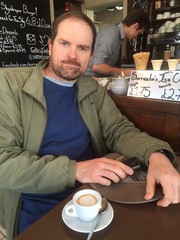 I am just really pleased with the way my little group of BSc students have risen to the challenge of submitting a "first 500 words on Evidence-based practice" to peermark. They are very lacking in confidence and find academic work thoroughly alien to their world of clinical expertise. It is a real joy and privilege to share a room with these guys as they open up about the challenges of embodied knowledge practice and the extreme skill that they deploy on a daily basis. But now they have to do knowledge work of a scholarly kind, and very often that is 'digital scholarship'. As module leader, I'm bringing them on in small steps and they're responding famously (we argue about whether these are 'small' steps :). As far as why this is happening, Glover et al's recent paper points back in my direction...
I am just really pleased with the way my little group of BSc students have risen to the challenge of submitting a "first 500 words on Evidence-based practice" to peermark. They are very lacking in confidence and find academic work thoroughly alien to their world of clinical expertise. It is a real joy and privilege to share a room with these guys as they open up about the challenges of embodied knowledge practice and the extreme skill that they deploy on a daily basis. But now they have to do knowledge work of a scholarly kind, and very often that is 'digital scholarship'. As module leader, I'm bringing them on in small steps and they're responding famously (we argue about whether these are 'small' steps :). As far as why this is happening, Glover et al's recent paper points back in my direction... However, the overarching theme evident from the interviews was that the preference of the module leader is the main driver of the use of technology in submission and feedback, even when they will be taking little part in the process.Any success I'm reporting here is not intended as a cheap boast. For me it highlights the necessary agency of academics to set the direction and expectations for what happens in terms of embedding digital literacy practices into the fabric of core learning and teaching activity. Something too many shy away from. Perhaps there is an analogy with children and the significance of their birth parents. No para-academic (e.g. learning technologist, librarian, administrator) can carry exactly the same weight of authority. We're living in times with earnest attempts to apply a 'division of labour' to university activities with the promise of more student centredness, maximising consistency, increasing efficiency and driving down costs. Whether or not these are worthy and entirely necessary goals in a time of 'austerity', we should consider whether tweaking the academic out of higher education may leave us with something other than 'higher education'. Is that what we want and who decides? For my part, I'll do what I can to help my students develop current scholarly practices and habits, many of which will incur 'the digital'.
GLOVER, Ian et al. Making connections: technological interventions to support students in using, and tutors in creating, assessment feedback. Research in Learning Technology, [S.l.], v. 23, oct. 2015. ISSN 2156-7077. Available at: <http://www.researchinlearningtechnology.net/index.php/rlt/article/view/27078>. Date accessed: 29 Oct. 2015. doi:http://dx.doi.org/10.3402/rlt.v23.27078.
